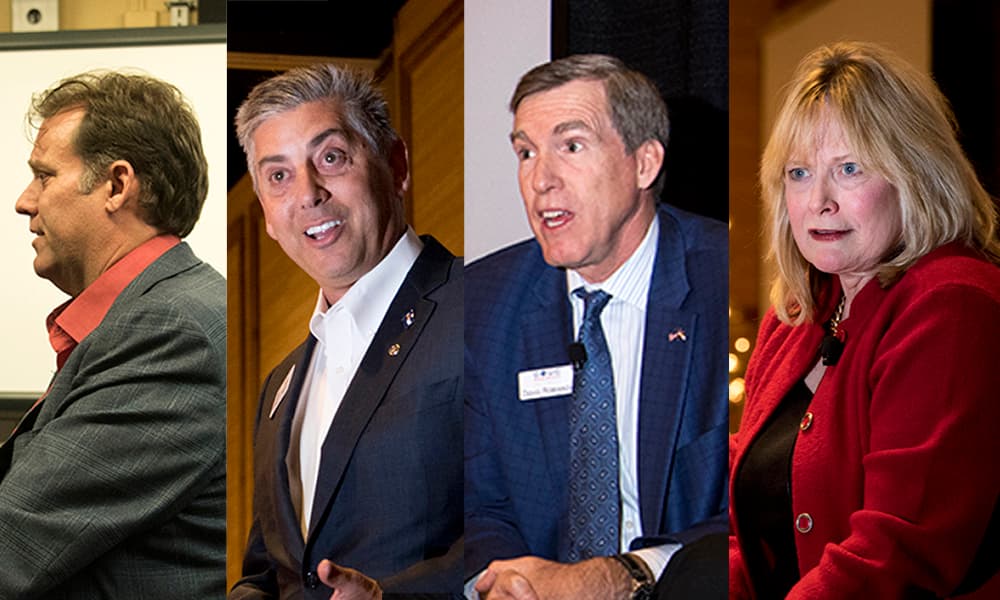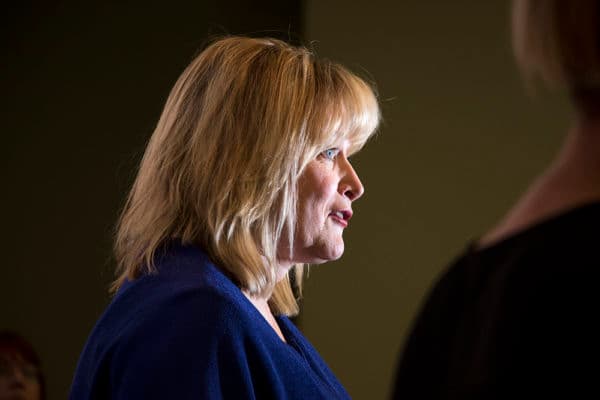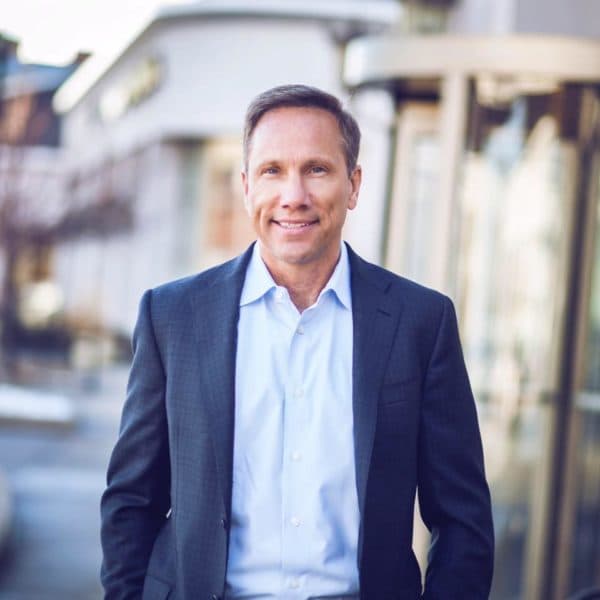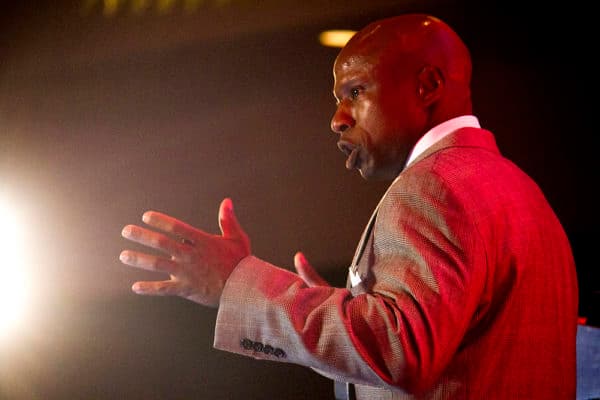
Colorado's Republican State Assembly will convene at the Coors Events Center in Boulder on Saturday to nominate statewide candidates for the June primary.
Two years ago, there were some surprises. This year, the stakes are even higher.
The governor’s seat is wide open, and much of the focus and excitement will likely be for the party’s gubernatorial hopefuls.
Two candidates appear to have the most to lose in the state assembly. That would be Attorney General Cynthia Coffman and Colorado Springs businessman Barry Farah.
Update: State Treasurer Walker Stapleton announced April 10 he would be abandoning the petition process and will be participating in the assembly.
Both are seeking their place on the primary ballot by earning at least 30 percent of delegates on Saturday. Neither filed petitions to appear in the ballot like State Treasurer Walker Stapleton, Victor Mitchell and Doug Robinson (Stapleton qualified last week).
Gubernatorial candidates Stephen Barlock, Lew Gaiter and Greg Lopez are also hoping to make it onto the primary ballot through the assembly.
“It’s very competitive,” Republican Party State Chairman Jeff Hays said. “And we have a lot of strong candidates ... I think people are still waiting and trying to evaluate these votes to see who they prefer.”
Assemblies really put the "process" in "political process." Here's what to expect.
Hays said the assembly will formally convene starting at 9 a.m., with delegates voting for their preferred candidates sometime around 10:30 (though Hays points out that this could end up being later). The party verifies the thousands of delegates and alternates, and votes on rules after the assembly begins. Rules can be changed at this time (for example, to allow candidates more allotted speaking time) but it requires a two-thirds majority, Hays said.
Delegates will vote for candidates for governor, treasurer, secretary of state, attorney general and a CU Board of Regents seat. Each candidate will get 12 minutes to speak to delegates. A random drawing will determine their order. Each candidate must be nominated before being given a chance to speak. Hays said that after all candidates from one of the races speak, delegates will vote.
Delegates will be given about three minutes to vote. They will be using remote-control clickers to vote, meaning the results should take about a minute or so to tally.
“And then, boom, it’ll show up on the screen and you’ll know if anybody got above 30 percent or whether you need to vote again,” Hays said. If nobody hits the 30 percent threshold, delegates will vote again. If by the second vote no candidate earns the 30 percent threshold, the top-two vote recipients will earn a spot in the ballot.
Things can get a little wild at the Republican assembly. Republican delegates aren’t committed to the candidate they supported at county assemblies. It leaves the door open to other candidates who can be nominated on the spot — or “on the floor” as they say — during the state assembly. It also means a person may switch allegiance last-second and vote for a candidate who may have changed their mind.
“Not anything can happen, but it could be interesting,” Hays said. “You could have somebody who totally out of the blue get nominated and they get a chance to speak.”
How well will Coffman perform?
Before Farah announced his candidacy, Coffman was the biggest name among Republican candidates who need to hit the 30 percent threshold in the state assembly. The biggest questions for her will be whether or not this will cause any issues for her and her goal to become Colorado's first female governor.

A poll released March 6 indicated Coffman had some work to do among likely Republican primary voters, trailing Stapleton by 13 points.
Coffman, who was not available for interview for this story, said in an interview with Denverite in March that she doesn't feel like an underdog. She said there are still a lot of people who are undecided (that poll from March backed that up, with nearly 40 percent undecided).
She's one of the few candidates, including Stapleton and Lopez, to have been previously elected to public office. She's been taking statewide tours for her campaign, a practice she enjoys because she said it allows her to see the "diversity" of Colorado.
"(It doesn't) feel all that different from what I've been doing, but the pace has certainly picked up," Coffman said, adding that her past experience running for office is an advantage. "Having been in statewide elected office, (I've) had the interactions in the legislature with cabinet members, and other elected constituents groups, you have a sense of where to go and (find) information, and who the influencers are."
Barry Farah is no fan of Coffman. Can he spoil her chances?
Farah could end up taking some delegates from Coffman. He confirmed in an interview with Denverite last month that one of the reasons he jumped into the race was to make it harder for her to get the nomination through the assembly.
“I don’t want a liberal who is soft on our Second Amendment rights, who has danced in a parade that is in opposition to the sanctity of marriage, who does not clearly come out with a decisive statement on protecting the lives of the innocent,” Farah said.
Farah said the field of candidates vying for the assembly vote didn't include a conservative voice before he got involved.

“It kind of breaks my heart,” Farah said. “The Republican Party used to mean something, and if it means anything it should mean that we preserve the American idea. We hold on to the founding principles and the idea of somebody coming out of the assembly at top of ballot, that is not a conservative, that does not agree on the Republican founding principles, is something that would be a bad thing. I would not want to see that happen if I have anything to do with it.”
If the assembly produces what he said is a “liberal” on the ballot and shifts the nomination process to petitioning candidates, Farah said the party would lose its soul and essentially be a “policy party.”
“The heart of why we’re a party is not being communicated,” Farah said. “I don’t hear it from anybody. What I bring to the table is a tested message that is thoroughly in my heart, way before I thought about running for anything politically, that I would bring to bear along with my skills and executive experience.”
The 2016 assembly saw a candidate rise from obscurity to high-profile nominee. Can that happen this year?
Two years ago, a relatively unknown county commissioner named Darryl Glenn sought the Republican nomination to run for U.S. senator. He shocked everyone by winning 70 percent of delegates at the state assembly. Two months later, Glenn would win the Republican primary and earn a speaking spot at the Republican National Convention.
Could this year’s assembly see a similar candidate?

Glenn was catapulted after a rousing speech, political consultant and former Colorado Republican party chairman Dick Wadhams said. But Glenn took other steps that helped propel him. (Sidenote: Glenn is running for Congress this year, seeking the nomination for Congressional District 5.)
"What people didn't fully appreciate, including me, was how much time Darryl Glenn had spent around the state talking to (Republicans)," Wadhams said. He continued: "The question is, would (his speech) have been as effective if he hadn't run around the state, establishing a closer relationship?"
Two candidates who have spent their time doing similar work are Lopez, the former Mayor of Parker, and Barlock, the former co-chair of President Trump's Denver campaign. Like Glenn, both candidates announced their candidacies more than year before Election Day.
"Both have gone to Republican dinners, clubs, where a lot of delegates do hang out," Wadhams said.
Barlock spoke to Denverite while attending precinct caucuses in Denver last month. Since announcing, he said he's traveled the state talking to people and delegates. The outspoken supporter of President Donald Trump said he feels like a bit of an outsider among the party's slate.
"I do believe the caucus process is more grassroots than paying, you know, 500 people to get signatures and beg for signatures," Barlock said. "I wasn't about to compete with these big dynasties, the millionaires who think that they deserve everything without going through the people. So I really wanted to have the opportunity, even though it was really hard for me, going through Trump, and achieving everything I did, I wanted to make sure others can be a part of this process that probably weren't there yet."
Want to attend?
You don't need to be a registered Republican, but you do have to pay a fee to attend as a guest. Colorado Republican Party spokesperson Daniel Cole said this costs $60. There are deals for younger folks: It's $20 for someone 35 or younger and $15 for people 16 and younger. These prices are for young adult guest badges, and Cole said the prices are lowered to encourage young Republicans to participate.












